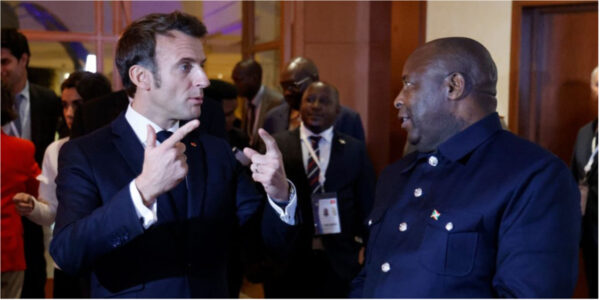A tweet resurfacing a video of Italy’s new prime minister calling out France for its colonial-style policies that rob African countries of their riches has raised questions about France’s post-colonization economic gains from the continent.
In the video, Prime Minister Giorgia Meloni is interviewed on a TV show where she holds up an African Financial Community or Communauté Financière Africaine (CFA) franc, a France-produced currency used in 14 African countries.
Meloni called the money a “colonial currency,” pointing out that it is printed in France “to which it applies seigniorage and by virtue of which it exploits the resources of these nations.”
The Italian prime minister then holds up an image of a child who she said works in a gold mine in Burkina Faso.
“Burkina Faso is one of the poorest nations in the world,” she continues. “France prints colonial money for Burkina Faso, which has gold in return, they demand that 50 percent of everything that Burkina Faso exports end up in the coffers of the French treasury.”
The gold the little African boy in the picture Meloni finds “mostly ends up in the coffers of the French state,” she said.
Meloni, a strong opponent of African migration, concludes that the policy strips the countries of their resources deteriorating their quality of life and leading to mass migration to Europe.
“So the solution is not to take Africans and bring them to Europe, the solution is to free Africa from certain Europeans who exploit it,” she said.
The video was shared in a tweet by right-wing Dutch commentator Eva Vlaardingerbroek and was viewed 12 million times. Even though it comes at the heels of a spat over immigration between the Italian leader and French President Emmanuel Macron, Meloni’s interview is actually from 2019.
Many commenters on Twitter have dismissed Meloni’s monologue in the video because of her aggressive anti-immigration policies. She is the existential nemesis of Africans seeking refuge in Italy. Meloni has recommended tightening the vetting process for asylum seekers, increasing deportations and implementing a naval blockade of North Africa.
Still, Meloni is among many critics that slammed France for its exploits leading to mounting pressure on Macron to finally make changes to the longstanding policy. However, France was not retaining a portion of Burkina Faso’s exports, as she claimed. The European powerhouse was, however, holding 50 percent of Burkina Faso’s and 13 other African countries’ financial reserves.
Is France still holding 50 percent of reserves from 14 African nations?
The countries that were previously under French rule using the CFA franc since 1945 are separated into two zones.
The West African CFA franc is used by Benin, Burkina Faso, Côte d’Ivoire, Guinea-Bissau, Mali, Niger, Senegal and Togo. Cameroon, the Central African Republic, Chad, the Republic of the Congo, Equatorial Guinea and Gabon use the Central African CFA franc.
The 14 countries account for 14 percent of Africa’s total population and represent 12 percent of the continent’s gross domestic product (GDP), or the overall value of its goods and services, according to the Harvard International Review.
Another version of the franc, the Comorian franc, is used by the Independent Union of Comoros, according to TRT World.

Before Macron announced reforms in December 2019, France required the African nations in the CFA franc zones to deposit 50 percent of their foreign exchange reserves with the French treasury in return for a guaranteed exchange rate with the euro.
The BBC points out that the countries were not mandated to use the francs, and leaders could access their reserves at any time with 0.75 percent interest from France.
However, critics argued that the policy limits the availability of assets when the African nations need them. They also lead to tariffs on exports and disable the economic development of the countries.
However, France points out that the arrangement resulted in lower inflation than in other African countries. Still, amid the economic downfall from the COVID-19 pandemic, the CFA franc zones have faced additional financial restraints, according to the Brookings Institution.
The reserves that were held in France had been closed and are now being managed by the Central Bank of West African States, African News reports.
France argued that the CFA franc “gives economies better resilience to macroeconomic shocks and helps control inflation by ensuring the stability of the currency, which is conducive to trade and investments.”
“The relative resilience of the Franc Zone countries compared to the rest of Africa during the 2020 public health crisis is indicative of that: 0.3 percent growth in 2020 as against 1.7 percent recession in sub-Saharan Africa (IMF, October 2021). Pegging to the euro is not an issue for the Zone’s exports, particularly for economies that export commodities that are priced on international markets,” France’s Ministry for Europe and Foreign Affairs says.
Macron announced his plan to move away from the currency two years ago. The nations using a version of the franc said they would adopt a singular currency, the eco, by 2027. But many are optimistic about the plan.
Nigerian policy analyst Olukayode Oyeleye called it “a dream for now” in a recent think piece. Nigerian is also part of the Economic Community of West African States, the group that plans to adopt the new currency.
In June, Kofi Konadu Apraku, ECOWAS commissioner, said none of the coalition’s 15 states, which include Burkina Faso, were ready to adopt the eco. The commissioner said the countries must have an annual average inflation rate of less than 10 percent and gross external reserves of more than three months of imports cover. Still, he was optimistic given the recent GDP growth and a drop in fiscal debt among the African nations.
Isabelle King, associate editor of the Harvard International Review, argues that the eco will not cut France’s colonial reins from the African nations.
“At a surface level, the reform appears to recognize French neocolonialism and attempts to take meaningful steps toward African sovereignty. These changes, however, are only symbolic,” King wrote. “They do not comprehensively liberate CFA countries from European dependence. Because the eco will also be backed by the Euro and operate under a fixed exchange rate, the change in this sense is purely nominal.”


